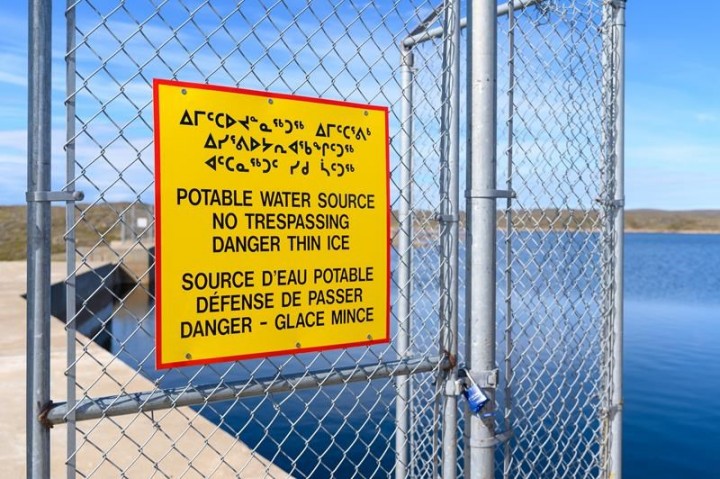IQALUIT, Nunavut — Nunavut’s capital was able to avert a water-shortage crisis last week, but the member of Parliament for the territory says infrastructure in the North is an issue of Arctic security.
Lori Idlout says federal investments in the North have often been inadequate to meet all of the infrastructure needs of communities and Ottawa tends to respond to emergencies rather than invest in long-term prevention.
“They always seem to forget how important Arctic sovereignty is when it comes to investing in the North,” the NDP MP said. “They need to do better for Arctic sovereignty, not just by providing military resources, but actually investing in the people and the resources that are needed to keep a community going.”
Iqaluit and Nunavut both declared states of emergency in August to ensure the territorial capital would be able to replenish its reservoir, Lake Geraldine, before it freezes so residents could have enough water to make it through the winter. The emergency ended early last week as the city obtained approval to begin pumping water from nearby Unnamed Lake.
It was not the first time there have been concerns about whether the reservoir can meet the needs of Iqaluit’s population of more than 7,700. A state of emergency was declared in 2019 to allow Iqaluit to pump water from Unnamed Lake. It has also been filling the reservoir from the Apex River since at least 2018.
The city made headlines when its water supply was contaminated by fuel in October 2021, forcing residents to fill containers with water from Sylvia Grinnell River or turn to bottled water flown in from Southern Canada.
“I’ve been hearing some level of frustration from the community for sure,” Idlout said. “I think there is a sense of hope knowing that the investments have been made, but hopefully it doesn’t take too long for the infrastructure to actually be updated and fixed so that the water that is available will be consistently reliable.”
The federal government committed more than $214 million in April to support a new reservoir and upgrades to Iqaluit’s water distribution system. The city said it expects it will take four years to complete the project.
Kaylia Little, a PhD student in the School of Environment, Enterprise and Development at the University of Waterloo, said Iqaluit’s water shortages are a “prime example” of the growing infrastructure gap between Canada’s North and South. She researched the connection between Iqaluit’s water crisis and northern infrastructure for the Arctic Institute.
“If Ottawa doesn’t have water or if Toronto doesn’t have water, we’re going to be hearing about it non-stop in the news and a solution would be found as quickly as possible,” she said.
“Putting Iqaluit in that same frame of mind and understanding the importance that it has not only for the local residents … but also what that means for somewhere where the government is based and what that impact might have across the territory.”
Little said Nunavut’s drinking water infrastructure is well below national standards, noting residents across the territory are reliant on trucked water.
The effects from climate change are increasing strain on aging and limited infrastructure in Nunavut, she added.
The deficit of more than 500 million litres of water in Lake Geraldine this year was caused by a lack of precipitation and flows on the Apex River being at a 40-year low.
The city initially said it would take 40 days to pump the necessary water from Unnamed Lake, but Iqaluit Mayor Kenny Bell said that has now been reduced to 21 days due to additional rainfall.
Bell said the water shortage has far-reaching effects, as it means new housing can’t be built, making it challenging to attract new residents and fill vacant positions.
However, he said council has approved a new subdivision that can begin construction as soon as the water issue is addressed.
Bell said the city’s longer term plans include making Lake Geraldine bigger and continuing to pump water from Unnamed Lake in the summer.
This report by The Canadian Press was first published Sept. 5, 2022.
— By Emily Blake in Yellowknife
___
This story was produced with the financial assistance of the Meta and Canadian Press News Fellowship.
The Canadian Press
Related


































